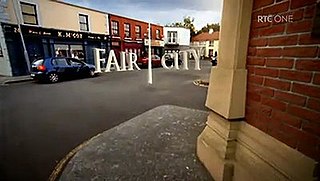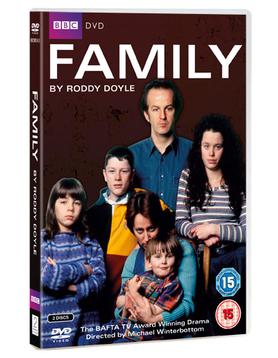Related Research Articles
A soap opera is typically a long-running radio or television serial, frequently characterized by melodrama, ensemble casts, and sentimentality. The term soap opera originated from radio dramas originally being sponsored by soap manufacturers. The term was preceded by horse opera, a derogatory term for low-budget Westerns.

Fair City is an Irish television soap opera which has been broadcast on RTÉ One since 1989. Produced by the public service broadcaster RTE, it first aired on Monday, 18 September 1989. It has won several awards and is both the most popular and the longest running Irish drama serial.

The Riordans is an Irish television Soap opera broadcast on RTÉ from 1965 to 1979 set in the fictional townland of Leestown in County Kilkenny. Its location filming with outside broadcast units, rather than using only television studios, broke the mould of broadcasting in the drama serial genre and inspired the creation of its British equivalent, Emmerdale Farm by Yorkshire Television in 1972.

The Panel is a talk show produced by Happy Endings Productions for RTÉ, based on the Australian programme The Panel, produced by Working Dog Productions for Network Ten. The theme song was "Waterfall" by The Stone Roses.

The Jacob's Awards were instituted in December 1962 as the first Irish television awards. Later, they were expanded to include radio. The awards were named after their sponsor, W. & R. Jacob & Co. Ltd., a biscuit manufacturer, and recipients were selected by Ireland's national newspaper television and radio critics. Jacob's Award winners were chosen annually until 1993, when the final awards presentation took place.
RTÉ Television is a department of Raidió Teilifís Éireann (RTÉ), Ireland's public service broadcaster. Its first channel was Telefís Éireann, which began broadcasting on 31 December 1961. Since the 1960s, RTÉ Television has added channels and digital television service.
The Kennedys of Castleross was an Irish serial drama or soap opera, about a family from Castleross, broadcast on Raidió Éireann from 1955 to 1973.

Family is a television drama mini-series that aired on RTÉ One and BBC1 in 1994. It was written by Roddy Doyle, the author of The Commitments, and directed by Michael Winterbottom.

Maura Laverty was an Irish novelist, playwright, journalist, broadcaster and cookery expert known for her work on the Irish television drama serial, Tolka Row. She published several novels, short stories and critical pieces throughout her career.

Paddy Crosbie was the Irish creator of the radio and television programmes The School Around The Corner and Back To School.
RTÉ One is an Irish free-to-air flagship television channel owned and operated by RTÉ. It is the most-popular and most-watched television channel in the country and was launched as Telefís Éireann on 31 December 1961, it was renamed RTÉ in 1966, and it was renamed as RTÉ 1 upon the launch of RTÉ 2 in 1978. It is funded partly by the government's licence fee; the remainder of the funding is provided by commercial advertising. Because RTÉ is funded partly by the licence fee it shows considerably fewer advertisements than most other channels available in Ireland and Northern Ireland.
The following is a list of events relating to television in Ireland from 1962.
The following is a list of events relating to television in Ireland from 1964.
The following is a list of events relating to television in Ireland from 1965.
The following is a list of events relating to television in Ireland from 1966.
Insurrection is an Irish documentary drama portraying the 1916 Easter Rising. It was written by Hugh Leonard and directed by Michael Garvey and Louis Lentin. It was first broadcast on Telefís Éireann in Ireland on 10 April 1966, and later on the BBC in the United Kingdom, ABC in Australia, and several other European countries. Only one series of eight episodes was made, with each episode broadcast on consecutive nights. The series was repeated on 1 May 1966 when it was shown in its entirety, and again in 2016 during the centenary of the Rising.
This is a timeline of the RTÉ Television channel in Ireland. In its early years, the channel was called Telefís Éireann
Chloe Gibson was an English theatre and television director, who directed Telefís Éireann's opening night on New Year's Eve 1961.
References
- ↑ "TV50: The 1960s". TV50 . RTÉ. Retrieved 5 February 2012.
- ↑ Quinlan, Ailin (18 June 2011). "The Mammy of Irish cookery". Irish Independent. Dublin. Retrieved 13 August 2012.
- ↑ Andy Irvine and Dónal Lunny (Interview) (20 December 2014). The Business, with Richard Curran (Podcast). Dublin: RTÉ Radio 1. Retrieved on 1 June 2015.